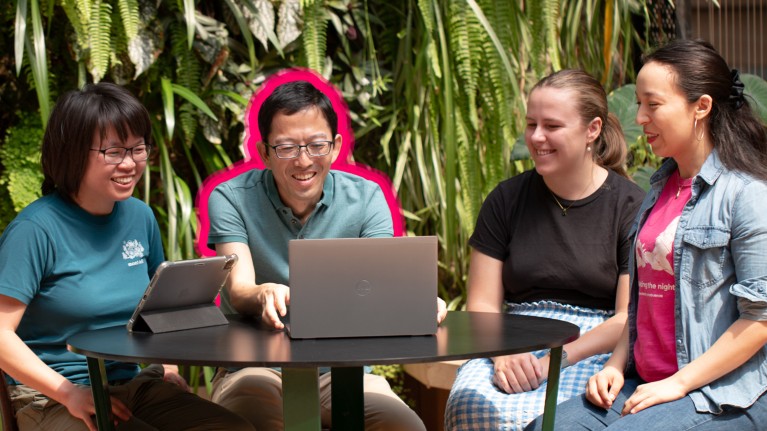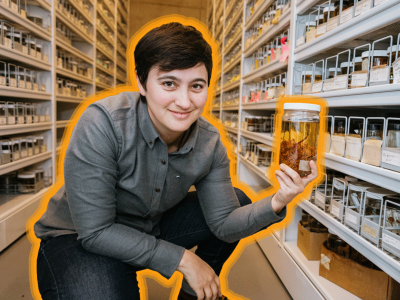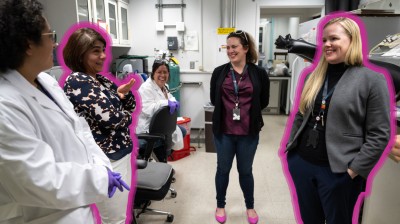
Tatsuya Amano works with members of the translatE project, which strives to make environmental science more accessible to non-fluent English speakers.Credit: Naoki Katayama
Japanese biologist Tatsuya Amano has always struggled with English. But he accepted that, as a scientist, he would need to make an extra effort to communicate his research in science’s lingua franca. After moving to the University of Cambridge, UK, as a postdoc studying biodiversity changes at the global scale, Amano realized that most of his colleagues whose first language was not English were facing the same challenges, spending considerably more time reading papers, polishing their manuscripts and preparing oral presentations than those who were fluent.
He also noticed that the quality of a paper was often conflated with the quality of English writing, leading to many rejections simply because certain language standards weren’t met. Amano identified this as a serious inequality issue, so he decided to speak up — and back up his message with data. In the past decade, he has published several papers investigating language barriers in science.
Championing queer scientists of colour: ‘I don’t think we’ve scratched the surface on systemic exclusion’
In one such survey-based study, non-fluent English speakers reported that their papers were rejected 2.5 times as often as those of fluent speakers, owing to language-related issues1. Amano thinks that objectively measuring the effects of language barriers will bring more awareness to this often-hidden bias and pave the way for solutions. “It’s really hard for native English speakers to see, and let alone experience, how not being fluent in English is commonly viewed as the same as being inferior as a scientist,” he says.
Amano, now a biodiversity researcher at the University of Queensland in Brisbane, Australia, tells Nature that science has a lot to lose by ignoring the inequalities caused by language barriers.
Who has been your biggest influence or mentor and why?
If I have to choose one, I’d say it’s Bill Sutherland, a conservation biologist at the University of Cambridge, because he has always shown me, and continues to show, how to make a real difference in the community. As a postdoc in his group, I watched him develop and lead the Conservation Evidence project, turning his idea of “having all the existing evidence on what works in conservation2 at your fingertips” into a reality. I was lucky to watch him build this huge project, actively involving and influencing many people around the world.
He is extremely solution-oriented. For example, when he realized that we needed to provide more training on the importance of evidence-based conservation practices for future generations, he quickly assembled a team of 117 educators from 23 countries to develop open-access teaching materials in several languages. If I hadn’t worked with Bill and seen the power of these actions, I probably would have asked myself, “As a conservation scientist, should I really be working on language barriers in science?” But thanks to Bill’s influence, I had confidence in his approach and did not hesitate to tackle this issue.
When did you decide to address language-related inequalities in science?
My first language is Japanese, and I struggle to communicate in English. Even now, I find it tough to write in English and prepare lecture materials. It was even a challenge to get ready for this interview. Initially, I saw this as my own problem.
But then, after I moved to Cambridge, I realized that this issue applies to almost every non-fluent English speaker.
One day, I looked up the number of people in the world whose first language is not English. It was 95% of the world’s population. That’s a massive number. And I thought, surely we can’t dismiss an issue that is affecting the inclusion of that much of the world. But this is not being seriously considered in academia. And that was the moment when I thought I should make a real change in science to better include non-native English speakers.
How have you dealt with issues of discrimination personally and professionally?
Last April, one of my co-authored papers was rejected because the level of English did not meet the journal’s standard. Unfortunately, this is still very common.
For a long time, many of us non-native English speakers assumed that such rejections were our own fault. And the entire scientific community has relied on individuals to overcome these barriers on their own. But I see this as a serious inequality issue, and it is costing the community because we are losing huge numbers of uniquely talented researchers. For example, many participants in our survey1 expressed frustration, anxiety and stress because they had to do science in English. They also reported that younger generations have not been able to pursue their academic careers owing to language barriers.
How Los Angeles neighbours partnered to show under-represented students the ‘unspoken rules’ to success
That’s why we have been advocating solutions to eliminate this kind of inequality — and that led us to review the policies of more than 700 biological science journals3. We proposed a set of linguistically inclusive policies for them to take up. For example, we recommended allowing manuscripts and abstracts to be published in relevant languages and having a public statement that manuscripts will be fairly assessed regardless of the perceived standard of English. I’m trying to make these barriers visible to everyone and propose productive solutions.




